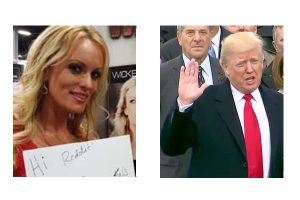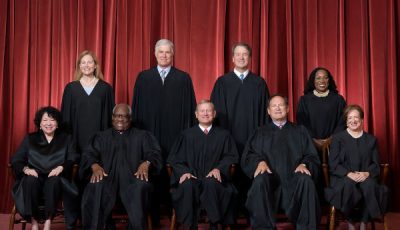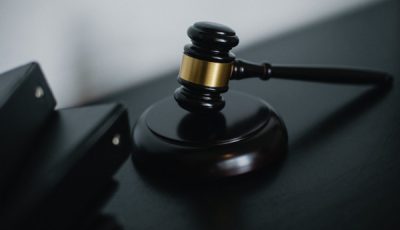Trump, Cohen Abandon Defense of Stormy Settlement Agreement
 LOS ANGELES – In court filings submitted last week, President Donald Trump, his former attorney Michael Cohen and Cohen’s company Essential Consultants all abandoned their defense of the nondisclosure agreement which has been challenged by adult performer Stormy Daniels (AKA Stephanie Clifford).
LOS ANGELES – In court filings submitted last week, President Donald Trump, his former attorney Michael Cohen and Cohen’s company Essential Consultants all abandoned their defense of the nondisclosure agreement which has been challenged by adult performer Stormy Daniels (AKA Stephanie Clifford).
“Plaintiff’s First Cause of Action for Declaratory Relief seeks the rescission of the Confidential Settlement Agreement dated October 28, 2016,” Cohen’s attorneys wrote in a supplemental statement filed Friday. “As set forth in the attached correspondence to Plaintiff’s counsel, Defendant Essential Consultants LLC has accepted the rescission of the Confidential Settlement Agreement and has provided Plaintiff with a Covenant Not to Sue in connection with same.”
In Trump’s supplemental statement, his attorneys wrote that they now agree with Daniels that the settlement agreement was “never formed.”
“Mr. Trump does not, and will not, contest Ms. Clifford’s assertion that the Settlement Agreement was never formed, or in the alternative, should be rescinded,” Trump attorney Charles Harder wrote in the statement. “Moreover, Mr. Trump has never taken the position that he is a party to the Settlement Agreement, or affirmatively sought to invoke any rights under the Settlement Agreement.”
On its face, the fact the opposing parties are abandoning the contested settlement agreement seems like it would be received by Daniels’ attorney, Michael Avenatti, as a victory. In a supplemental statement filed with the court Monday morning, however, Avenatti wrote that the “Plaintiff vigorously opposes dismissal of this action.”
“As a preliminary matter, Defendants’ sudden desire to escape having to defend this action without any meaningful consequence reflects a profoundly troubling reality – that Defendants have been shamelessly deceiving this Court and the American public for more than six months,” Avenatti wrote, followed by a lengthy recitation of the history of the case, from Daniels’ perspective.
Avenatti also noted that for a defendant who now says he never took the position he was a party to the agreement, Trump previously seemed quick to claim victory in the case during its early stages.
“On the basis of what Defendants now admit was an arbitration complaint that was bogus and completely lacking any factual or good faith basis, Mr. Cohen, through his company EC, convinced a retired judge and arbitrator to issue a broad and sweeping restraining order directed to Ms. Clifford,” Avenatti wrote. “The White House had the audacity to then quickly claim victory, boasting to the press that the arbitration had already been won.”
Avenatti also observed that the defendants previously weren’t shy about asserting the agreement was not only valid and enforceable, but potentially ruinous for Daniels to break, as well.
“When Plaintiff then filed this action and stated the Agreement was invalid, Defendants took great umbrage and even went so far as threatening Plaintiff that she would have to pay $20 million in damages,” Avenatti wrote. “In fact, Defendants were so confident that the Settlement Agreement was formed, was valid, and was enforceable, that they elected to prosecute a motion to compel arbitration in this Court – a motion EC filed and in which Mr. Trump joined.”
Daniels’ supplemental statement also raises several arguments asserting that Trump and Cohen abandoning their defense of the settlement agreement does not moot her case, noting that while the defendants “in vague and equivocal fashion claim they are conceding that an agreement was never formed,” they haven’t “conceded all of the relief” sought by Daniels.
Among other things, Avenatti asserted the defendants have not offered Daniels a final judgment declaring that the settlement agreement is “is invalid, unenforceable, and/or void under doctrine of unconscionability,” or that the agreement is “void ab initio because it is illegal on the ground that it was entered with the illegal aim, design, and purpose of circumventing federal campaign finance law under the Federal Election Campaign Act,” the latter of which Cohen appears to have conceded in making his plea agreement in the criminal case filed against him in the Southern District of New York.
Both Trump and Cohen’s filings argue Avenatti’s points are all moot, citing the case Arizonans for Official English v. Arizona in asserting that “an actual controversy must be extant at all states of review, not merely at the time the complaint is filed.”
Avenatti counters that the defendants’ “communications are not a serious concession of responsibility and liability, but instead must be viewed as a mere settlement offer” and as such, “they fail to moot this case.”
A scheduling conference in the case is currently set for September 24 at 2 p.m.













